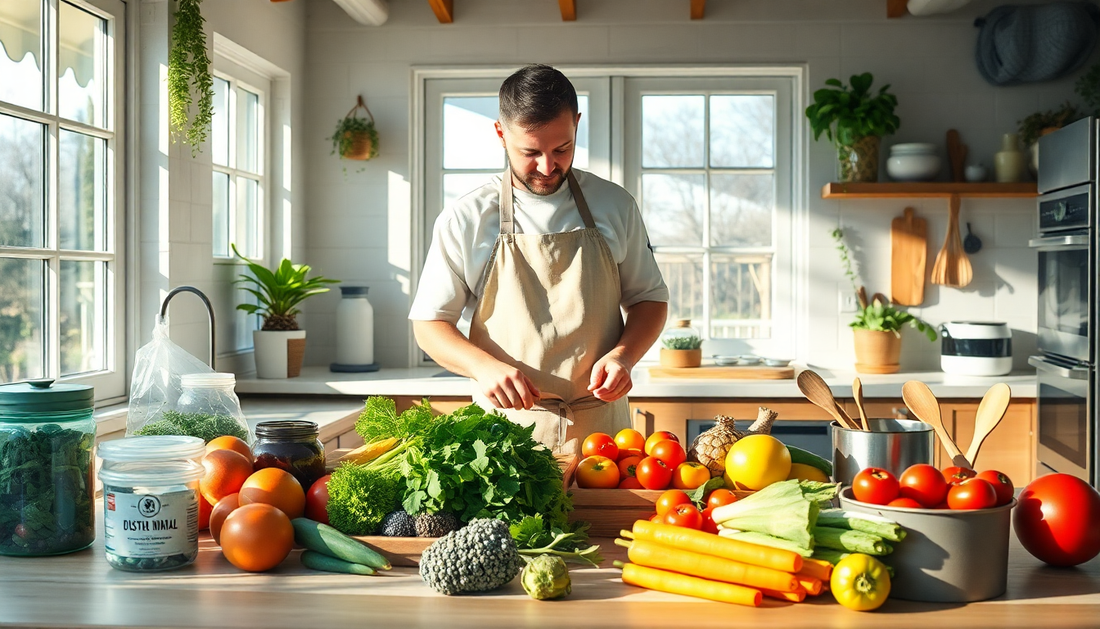In a world increasingly conscious of our environmental impact, the kitchen has become a crucial battleground in the fight for sustainability. As we strive to reduce our carbon footprint and live more conscientiously, the way we cook and the tools we use have taken on a newfound significance. Welcome to the world of eco-friendly cooking, where every meal can be a step towards a greener future.
Understanding Eco-Friendly Cooking
Eco-friendly cooking, at its core, is about minimizing the environmental impact of our culinary practices. It's a holistic approach that encompasses everything from the appliances we use to the ingredients we choose, all with the goal of reducing waste, conserving resources, and promoting a more sustainable food system.
At the heart of eco-friendly cooking lies a deep respect for the planet and a commitment to making conscious choices. It's about recognizing that the way we prepare our meals can have a profound effect on the world around us, and taking responsibility for that impact.
The Benefits of Eco-Friendly Cooking
The benefits of embracing eco-friendly cooking practices are manifold. Not only does it help to reduce our carbon footprint and protect the environment, but it can also have a positive impact on our personal health and well-being.
By choosing energy-efficient appliances, reusable kitchenware, and sustainable ingredients, we can significantly reduce our energy consumption, water usage, and waste production. This, in turn, helps to conserve natural resources, minimize greenhouse gas emissions, and support a more circular economy.
Moreover, eco-friendly cooking often involves the use of fresh, unprocessed ingredients, which are not only better for the planet but also more nutritious for our bodies. By embracing a plant-based, whole-food approach to cooking, we can nourish ourselves while also reducing our reliance on industrialized food systems.
Sustainable Kitchen Equipment
One of the cornerstones of eco-friendly cooking is the use of sustainable kitchen equipment. From energy-efficient appliances to reusable cutlery and utensils, the choices we make in our kitchens can have a profound impact on our environmental footprint.
Energy-Efficient Appliances
When it comes to kitchen appliances, energy efficiency is key. Look for models that are certified by organizations like ENERGY STAR, which ensure that they meet strict energy-saving standards. These appliances, such as induction cooktops, convection ovens, and high-efficiency dishwashers, can significantly reduce your energy consumption and lower your utility bills.
Reusable Cutlery and Utensils
Single-use plastics have become a scourge on our planet, contributing to the growing problem of waste and pollution. As eco-conscious consumers, we can make a difference by choosing reusable cutlery and utensils, such as those offered by Builditfy.
Lightweight, durable, and dishwasher-safe, Builditfy's reusable cutlery is the perfect alternative to disposable plastics. Available in a variety of colors and styles, these eco-friendly tools allow you to enjoy your meals without the guilt of contributing to the plastic waste crisis. By making the switch to Builditfy, you'll be joining the eco movement and taking a stand for a greener tomorrow.
Eco-Friendly Cookware Materials
The materials used in our cookware can also have a significant impact on the environment. Look for pots, pans, and bakeware made from sustainable materials like stainless steel, cast iron, or ceramic. These durable options not only last longer than their non-stick counterparts but also avoid the use of harmful chemicals and coatings.
Low-Impact Cooking Techniques
In addition to the equipment we use, the way we cook can also play a crucial role in reducing our environmental impact. By adopting low-impact cooking techniques, we can conserve energy, minimize food waste, and promote more sustainable food systems.
Minimizing Energy Consumption
One of the primary ways to reduce the environmental impact of cooking is to minimize energy consumption. This can be achieved through techniques like batch cooking, which involves preparing multiple meals at once to reduce the overall energy used. Slow cookers and pressure cookers are also excellent options, as they use less energy than traditional ovens or stovetops.
Reducing Food Waste
Food waste is a significant contributor to environmental degradation, as it not only squanders valuable resources but also generates methane, a potent greenhouse gas. By adopting smart meal planning strategies, properly storing and preserving our food, and finding creative ways to use up leftovers, we can dramatically reduce the amount of food that ends up in the trash.
Choosing Sustainable Ingredients
The ingredients we choose for our meals can also have a profound impact on the environment. Opting for locally sourced, organic, and plant-based ingredients can help to support sustainable agriculture, reduce the carbon footprint of our food, and promote biodiversity.
Alternative Cooking Methods
While traditional cooking methods have their place, the world of eco-friendly cooking offers a wealth of alternative techniques that can further reduce our environmental impact.
Solar Cooking
Solar cooking, which harnesses the power of the sun to prepare meals, is a fascinating and eco-friendly alternative to conventional cooking methods. These specialized ovens and cookers use reflective surfaces to concentrate the sun's rays, allowing for efficient and emissions-free cooking.
Slow Cookers and Pressure Cookers
As mentioned earlier, slow cookers and pressure cookers are excellent energy-saving options for eco-conscious cooks. These appliances use significantly less energy than traditional ovens or stovetops, making them a more sustainable choice for long-simmered dishes or quick-cooking meals.
Batch Cooking and Meal Prep
Batch cooking and meal prepping are not only time-saving strategies but also eco-friendly ones. By preparing multiple meals at once, you can reduce the overall energy used in the kitchen and minimize food waste by ensuring that leftovers are properly stored and consumed.
Smart Kitchen Practices
Eco-friendly cooking is not just about the equipment and techniques we use, but also the everyday habits and practices we adopt in the kitchen. By incorporating sustainable habits into our daily routines, we can further reduce our environmental impact and contribute to a greener future.
Meal Planning and Composting
Proper meal planning is a crucial component of eco-friendly cooking. By creating a weekly or monthly meal plan, you can ensure that you only purchase the ingredients you need, reducing food waste and unnecessary trips to the grocery store. Additionally, composting your food scraps can help to divert organic waste from landfills and create nutrient-rich soil for your garden or local community.
Recycling and Waste Reduction
In the kitchen, reducing waste and properly recycling can make a significant difference. From separating recyclables to finding creative ways to reuse or repurpose items, every small step can contribute to a more sustainable future.
Technology and Eco-Cooking
As technology continues to evolve, it has also become a powerful ally in the pursuit of eco-friendly cooking. From smart kitchen gadgets to innovative apps and online resources, there are countless tools and technologies that can help us streamline our sustainable cooking practices.
Smart Kitchen Gadgets
The world of smart kitchen gadgets is constantly expanding, offering a wealth of eco-friendly solutions. From energy-monitoring devices to intelligent composters, these cutting-edge tools can help us optimize our energy usage, reduce food waste, and make more informed decisions about our cooking habits.
Apps and Online Resources
In addition to physical tools, there are also a growing number of apps and online resources dedicated to supporting eco-friendly cooking. From recipe databases featuring sustainable ingredients to meal planning apps that help reduce food waste, these digital tools can be invaluable in our journey towards a greener kitchen.
Conclusion
As we navigate the ever-evolving landscape of sustainable living, the kitchen has emerged as a crucial battleground in the fight for a greener future. By embracing eco-friendly cooking practices, we can not only reduce our environmental impact but also nourish ourselves and our communities in a more conscious and responsible way.
From the equipment we use to the techniques we employ, every choice we make in the kitchen has the power to make a difference. By adopting energy-efficient appliances, reusable cutlery, and low-impact cooking methods, we can collectively work towards a more sustainable food system and a healthier planet.
So, let us embark on this journey together, one meal at a time, as we discover the joys and rewards of eco-friendly cooking. With a little creativity, a dash of innovation, and a deep respect for our planet, we can transform our kitchens into hubs of sustainability, paving the way for a greener, more resilient future.

